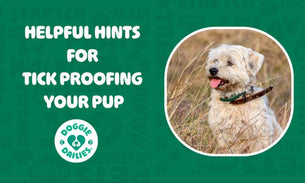If you live anywhere near a wooded area or tall grass and take your dog to walk there, or if you spend a lot of time outdoors in general, you might be concerned about ticks. Not only can they make you and your dog uncomfortable, they run the risk of spreading dangerous diseases to all the members of your family.
Here are some ways to help prevent bringing any little hitchhikers home with you.
Be Aware If Ticks Are In Your Area...
If you have seen one, chances are that there are more hiding. A dog’s thick coat makes it an ideal home for ticks. Always check your dog after a walk in an area where there might be ticks. Ticks can be as small as a sesame seed prior to a feeding, but can quickly grow to several times their original size.
Ticks will most frequently attach themselves to your pet’s face, ears, legs, paws, chest, and abdomen, so pay careful attention to these areas. If it is an all-day excursion, check several times throughout the day. Try to stay on the beaten path while out walking and avoid thick underbrush.
Make Sure Grass & Weeds Are Kept Cut...
When at home, make sure that grass and weeds are kept cut and are not overgrown. Treat outdoor areas that your pet frequents with a pesticide that kills ticks. Ticks love thick, damp underbrush as a home.
Have Your Dog On A Flea Preventative...
It is also helpful to have your dog on some form of tick preventative. This can be in the form of a topical treatment put on once a month or a dip or shampoo that is used more frequently. Check with your veterinarian for the best treatment option for your pet. Always read warnings and directions on the label carefully before applying. Do not apply topical products one after another as you might overdose your pet. For example, do not use a topical treatment immediately after a dip – allow for at least 48 hours in between.
Chemical Alternatives For Repelling Ticks...
If you are concerned about using pesticides, there are also alternative therapies available to repel ticks. These include garlic tablets, herbal shampoos, or oils that are applied to your pet that makes him less appetizing to the ticks. These may not be as effective as their chemical counterparts, so make sure that you continue to check your pet frequently for stray ticks.
If you spend a lot of time in tick-prone areas, talk to your vet about getting a Lyme disease or other tick vaccinations to help protect your pet.
If You Do Find A Tick...
If you do find a tick on your pet, it is important to remove it as soon as possible. While ticks are small and hard to find initially, they can swell to the size of a pea or larger after a blood meal. Wearing gloves and using a pair of fine-pointed tweezers, grasp the tick by its head or mouthparts as close to your pet's skin as possible. You might need a second person to help restrain your dog or part his hair while you do this.
Pull firmly outward until the tick is removed – being absolutely certain that you removed the head as well. Kill the tick by putting it in a vial of alcohol. Label the jar with the date and the area you were in when you got the tick and take it to the veterinarian. Your vet can then determine what kind of tick it was and what treatments might be necessary. Do not use petroleum jelly, matches, alcohol, or other irritants to remove the tick – these will only initiate a response to grab on harder and release more toxins. After removing the tick, disinfect the entire bite site with alcohol.
If You See Ticks On Your Dog, Watch For Symptoms Of A More Serious Disease...
If anything out of the ordinary seems to be going, contact your veterinarian immediately. Symptoms of tick-borne diseases include lethargy, appetite loss, weakness, pale gums, fever, lameness, vomiting, and even paralysis. However, these are also symptoms of various other diseases, and only your veterinarian can make the determination whether it was from the ticks or not. If you see any symptoms, get your dog to the vet as soon as possible – the sooner the diagnosis the more effective treatment will be.
Keeping an eye out for ticks on your dog will keep both of you healthy and happier and let you enjoy your time together outdoors.








